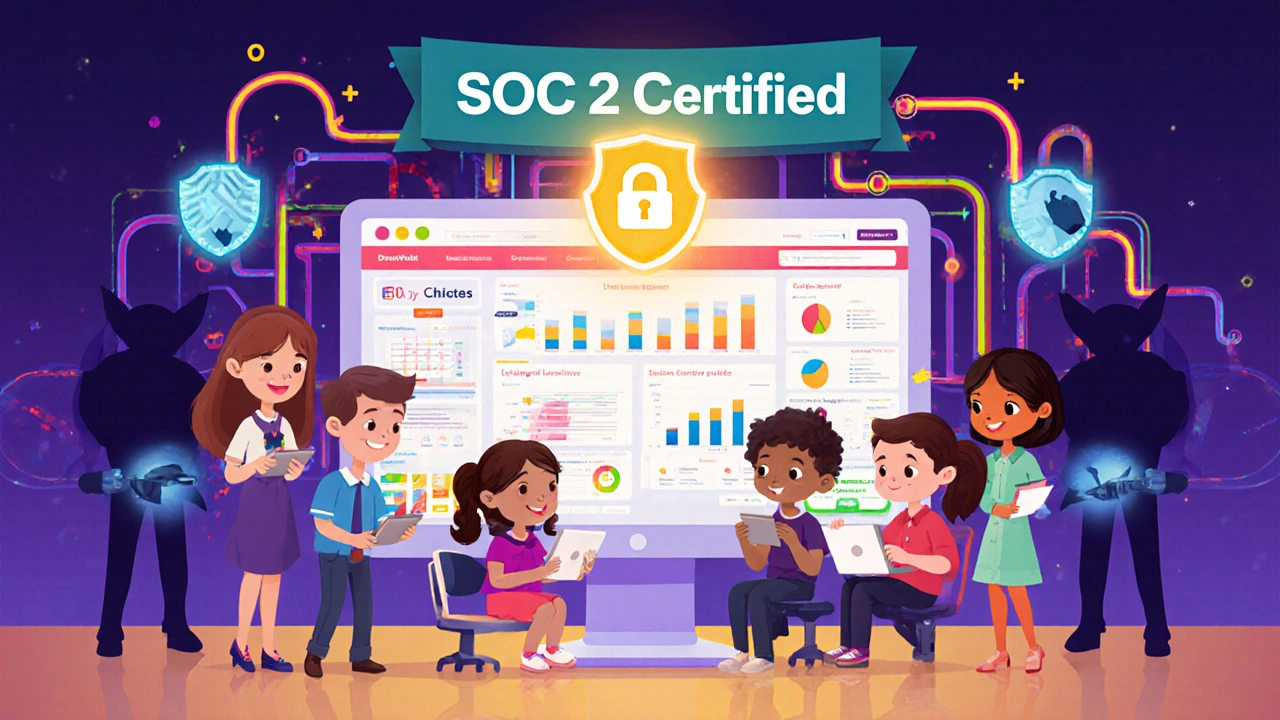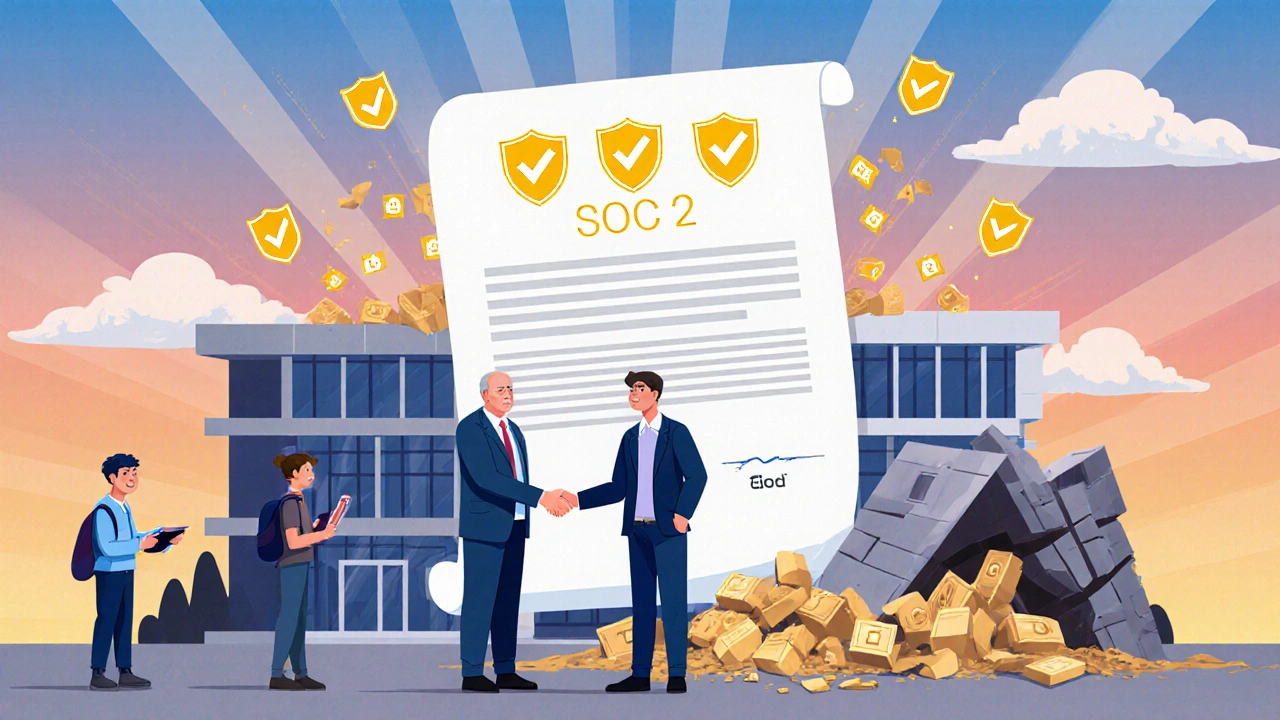SOC 2 Certification for Learning Platforms: What It Takes to Get It Right
 Jun, 29 2025
Jun, 29 2025
Why SOC 2 Certification Matters for Learning Platforms
If you run a learning platform-whether it’s a corporate LMS, a K-12 online classroom tool, or a subscription-based course site-your users trust you with their data. That includes names, emails, payment info, progress records, and sometimes even biometric data from proctored exams. One breach, one leaked student record, and your reputation doesn’t just take a hit-it collapses. That’s where SOC 2 certification comes in. It’s not just a checkbox. It’s proof you’ve built security into your platform from the ground up.
Unlike ISO 27001 or HIPAA, SOC 2 isn’t about following a rigid rulebook. It’s about proving you handle data responsibly across five trust principles: Security, Availability, Processing Integrity, Confidentiality, and Privacy. For learning platforms, Security and Privacy are non-negotiable. Availability matters too-no one wants a student locked out during a final exam. Processing Integrity ensures grades and progress aren’t corrupted. Confidentiality protects sensitive user data from being seen by the wrong people.
The Five Trust Services Criteria Explained
Every SOC 2 report is built around these five criteria. But not all apply equally to learning platforms. Here’s what actually matters:
- Security: This is the foundation. Do you use multi-factor authentication? Are passwords stored securely? Is your network monitored for intrusions? If your platform lets users log in, this is your starting point.
- Privacy: You’re collecting personal data-names, birthdates, locations, even learning styles. SOC 2 requires you to clearly say how you use it, who you share it with, and how long you keep it. If you sell anonymized usage data to third parties? You need explicit consent and strict controls.
- Availability: Your platform can’t be down when students are taking quizzes. SOC 2 asks: Do you have redundancy? Backups? A disaster recovery plan? Most platforms aim for 99.9% uptime. SOC 2 expects you to prove it with logs and response times.
- Processing Integrity: Grades must be accurate. Certificates must be issued correctly. If your system auto-generates certificates or calculates scores, it must do so without errors or manipulation. This isn’t about speed-it’s about reliability.
- Confidentiality: Only authorized users should see sensitive data. A teacher shouldn’t access another class’s grades. Parents shouldn’t see other kids’ records. Role-based access controls aren’t optional here.
Many platforms skip Confidentiality and Processing Integrity because they seem "nice to have." But auditors don’t care about your intentions-they care about your controls. Skip them, and your audit fails.
Who Needs SOC 2? And Who Doesn’t
Not every learning platform needs SOC 2. If you’re a small tutor offering Zoom calls and Google Forms, you probably don’t. But if you’re selling to schools, districts, or enterprises, you’re already in the game.
Here’s when SOC 2 becomes mandatory:
- You’re selling to K-12 schools in the U.S.-they’re required by FERPA to only work with vendors who have SOC 2 or equivalent.
- You’re onboarding corporate clients with 500+ employees-they all demand SOC 2 before signing contracts.
- You store payment info or integrate with banking systems (like Stripe or PayPal).
- You handle health or special education data-even if you don’t call it "medical," FERPA and ADA treat it as sensitive.
Startups often think they can wait until they’re bigger. That’s a mistake. If you’re pitching to a district superintendent or a Fortune 500 HR team, they’ll ask for your SOC 2 report before even looking at your pricing page. No report? No deal.

The Real Cost of Getting Certified
SOC 2 isn’t cheap. But it’s not just about money-it’s about time and focus.
A Type II audit (the one that matters) typically costs between $15,000 and $50,000, depending on your platform’s complexity. Smaller platforms with simple architectures and fewer users might pay closer to $15K. Large platforms with AI recommendations, video streaming, and third-party integrations? Expect $40K+. You also need to hire a CPA firm that specializes in SOC 2-not just any auditor.
But the hidden cost? Your team’s time. You’ll need to:
- Document every security policy: password rules, incident response, employee training, vendor management.
- Train every employee-even your customer support team-on data handling.
- Install logging tools to track who accesses what data and when.
- Fix gaps: outdated software, shared admin passwords, unencrypted databases.
Most companies spend 6-9 months preparing. You can’t rush it. If you try to fake it, auditors will catch you. They don’t just look at your policies-they test them. They log in as a user. They try to access admin panels. They check if your backups actually restore.
What Happens During the Audit
There are two types of SOC 2 reports: Type I and Type II. Type I is a snapshot-it says your controls exist on paper. Type II is the real deal-it proves they work over time, usually over 3-12 months.
Here’s what the auditor does:
- They review your policies and procedures.
- They interview your team-developers, support, HR, ops.
- They test controls: Can you prove you disable accounts when someone leaves? Do you scan for vulnerabilities monthly? Are your cloud servers configured correctly?
- They pull logs from your systems: Who logged in? When? From where? What did they do?
- They check your third-party vendors-your hosting provider, email service, CRM. If they’re not compliant, you’re not compliant.
One common failure? Employees using personal Google Drive folders to share student files. Auditors find this all the time. Another? Missing encryption on database backups. Or using the same password across 12 tools.
Don’t think you can hide behind "we’re a small team." Auditors don’t care about your size. They care about your controls.
What Comes After Certification
Getting SOC 2 isn’t the finish line-it’s the starting line.
You’ll need to renew every year. And every year, your platform changes. You add a new feature. You switch cloud providers. You onboard a new vendor. Each change requires re-evaluation.
Most platforms fail their renewal because they got lazy. They stopped training new hires. They ignored a security alert. They let a third-party tool lapse into non-compliance.
Keep your SOC 2 alive by:
- Running quarterly internal audits-even if no one’s watching.
- Updating your policies every time you add a new tool.
- Training every new hire on day one-not six months later.
- Using automated tools to monitor access logs and system changes.
Companies that treat SOC 2 as a one-time project end up with expired reports. Companies that treat it as part of their culture keep winning contracts.

Alternatives to SOC 2 (And Why They’re Not Enough)
Some platforms try to cut corners with ISO 27001, GDPR, or FERPA alone. But here’s the truth:
- GDPR only covers EU residents. If you serve U.S. schools, it doesn’t help.
- FERPA applies to schools, not your platform. You still need to prove you’re secure.
- ISO 27001 is great-but it’s broader and more complex. Most edtech companies choose SOC 2 because it’s focused on data handling, not general IT management.
SOC 2 is the gold standard for SaaS platforms handling user data. It’s trusted by schools, enterprises, and regulators. No other certification gives you the same level of trust in the U.S. education and corporate training markets.
Getting Started: Your 90-Day Roadmap
Here’s how to begin without getting overwhelmed:
- Week 1-2: Identify your scope. What systems handle user data? List your servers, apps, databases, and third-party tools.
- Week 3-4: Pick your trust criteria. Start with Security and Privacy. Add Availability if you’re mission-critical.
- Month 2: Document everything. Write policies for access control, incident response, data retention, and vendor management. Use templates from the AICPA.
- Month 3: Fix gaps. Disable shared passwords. Enable MFA everywhere. Encrypt backups. Train your team.
- Month 4: Hire a CPA firm. Get quotes. Ask for references from edtech clients.
Don’t try to do this alone. Use tools like Vanta, Drata, or Secureframe-they automate policy creation, evidence collection, and audit prep. They won’t replace human oversight, but they’ll cut your prep time in half.
Final Thought: SOC 2 Isn’t About Compliance. It’s About Trust.
SOC 2 certification doesn’t make your platform more secure. Your team does. The audit just proves you’re serious.
When a school district chooses your platform over a competitor’s, they’re not choosing the one with the prettier interface. They’re choosing the one that can prove it won’t leak their students’ data. That’s the power of SOC 2. It turns your security work into a competitive advantage.
Start now. Don’t wait for a client to ask. Build trust before you need it.
Michael Gradwell
October 29, 2025 AT 20:38Ian Maggs
October 30, 2025 AT 00:13Wilda Mcgee
October 31, 2025 AT 22:49Emmanuel Sadi
November 1, 2025 AT 08:50Nicholas Carpenter
November 2, 2025 AT 05:13Chuck Doland
November 3, 2025 AT 23:15Madeline VanHorn
November 4, 2025 AT 03:15Glenn Celaya
November 5, 2025 AT 08:14Chris Atkins
November 5, 2025 AT 15:23Jen Becker
November 5, 2025 AT 16:48Ryan Toporowski
November 7, 2025 AT 07:59Samar Omar
November 7, 2025 AT 20:41chioma okwara
November 8, 2025 AT 08:00Mbuyiselwa Cindi
November 9, 2025 AT 16:05Henry Kelley
November 10, 2025 AT 09:34Victoria Kingsbury
November 10, 2025 AT 23:36Tonya Trottman
November 11, 2025 AT 12:36Flannery Smail
November 12, 2025 AT 09:14